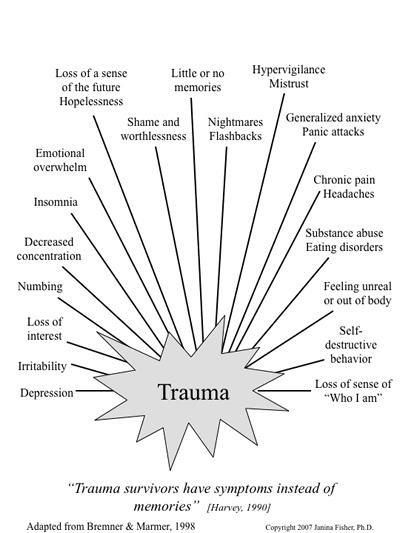The goal of this post today is to be informative and bring attention to something that is incredibly important but rarely discussed.
So bear with me. It is worth the read.
One of the biggest challenges I faced during my battle with leukemia was something unexpected—something I didn’t even understand for a long time:
Mental Trauma
I was only twelve years old when I got diagnosed and began my two-and-a-half year chemo treatment. Read more about that here.
A little over one year into that treatment regimen, I was suffering from severe anxiety, depression, and PTSD.
And I didn’t even know it.
I had no idea what any of those things were. I just felt like I was in emotional despair all the time.
While I was battling a countless number of chemo side-effects and an immense amount of physical pain, I also spent each day with a mass of overwhelming emotions pushing on the walls of my chest.
I felt like I couldn’t keep going.
Everything felt terrible. My life felt like too much. I felt like there was a physical weight on my chest. I didn’t want to go to the doctor and be tortured even one more time.
At this point, already-impossibly-hard life became unbearable.
I had reached my limit with physical pain, and then a great amount of emotional suffering jumped into the picture.
And I still had a year-and-a-half to go.
I wanted to stop breathing…
And I almost did.
This was the point in time that I refused my treatment for a short while. I needed my physical and emotional suffering to end.
I had no idea why I felt the way I did. Neither did my family.
And after my treatment finally ended, my feelings only persisted and worsened. I began to frequently have severe panic attacks, flashbacks, and emotional breakdowns.
And it still felt like life was unbearable.
I didn’t understand that I had developed anxiety, depression, and PTSD until I was hopelessly entangled in all three.
We all just assumed that how I was feeling would end when
Everyone should read the next line carefully:
The state of your mind is just as important (if not more important than) the state of your physical body.
Your mental health includes your emotional, psychological, and social well-being. It can affect how you feel, think and act.
Your mental state also dictates how you handle stress, relate to other people, how you make choices, and how you feel about life at any given time.
While it is common knowledge that cancer patients struggle physically as they fight for their lives and endure chemotherapy, the mental effects of battling cancer are often much less apparent.
One of the least-discussed, most common, and most difficult side effects of cancer and chemotherapy is the potential to develop anxiety, depression, and PTSD.
That’s right. The majority of cancer patients will deal with not only one, but usually a combination of these three things.
Why is this?
To explain, let’s look at a few of the most common causes of these mental disorders to develop.
Common Causes of Anxiety
1) Trauma.
This can include being the victim of trauma, being close to someone who’s the victim of trauma, or witnessing something traumatic.
2) Stress.
Excessive or unresolved stress can increase your chances of developing anxiety.
3) Brain chemistry.
Stressful or traumatic experiences and genetic factors can alter brain structure and function to react more intensely to triggers that would not previously have caused anxiety.
Common Causes of Depression
1) Death or loss. This includes the loss of health.
2) Abuse. This includes emotional and physical abuse.
3) Major events. This includes any big life changes, good or bad.
4) Serious illnesses. (need I say more?)
Additionally, the chemical side-effects of certain chemos can physically alter brain chemistry and/or the physical structure of the brain, leading to anxiety or depression. No trauma necessary.
Common Causes of PTSD (Post Traumatic Stress Disorder)
PTSD is commonly caused by a terrifying event; either experiencing it or witnessing it.
Common events that trigger PTSD include:
1) Fighting in a war
2) Getting in a car accident
3) Sexual assault
4) Natural disasters
5) Watching a loved one die
6) Being diagnosed with a life-threatening illness
By now, you should be picking up on a pattern for what can lead to anxiety, depression, or PTSD.
Stress? Trauma? Extenuating health issues? Life-threatening illnesses?
Ding Ding! That is basically a description of what cancer patients deal with on a good day.
Cancer and chemotherapy present the ideal environment for mental trauma that can lead to anxiety, depression, or PTSD.
So, if/when you struggle with any of these things, know this:
It does not mean you are weak-minded or do mean that you weren’t strong enough.
These things are a natural product of traumatic experiences. Your brain is acting in the way that it is wired to act.
What you are experiencing is normal, given your circumstances.
(We will dive deeper into all of these things in future blog posts)
For now, continue to read on.
Anxiety, depression, and PTSD are some of the most dangerous side effects that a cancer patient or survivor can develop.
Why?
Because these mental disorders (without cancer in the picture) can make life feel exceedingly difficult, too overwhelming, or even unbearable at times.
Cancer patients are just trying to survive cancer and chemotherapy as it is.
It is an immense challenge to survive the mental and emotional challenges of cancer without anxiety, depression, or PTSD coming into photo-bomb the already-horrible picture.
This is why the mental health of cancer patients and survivors is so important.
So, if mental health is such a big concern for cancer patients, why are cancer patients (like me) usually caught off guard?
There are three major reasons:
1) It’s like everyone is so caught up in just saving a cancer patient’s physical body that they neglect to say: “Oh, hey, by the way, what you are about to go through? Yeah, it’s going to be so incredibly traumatic that you will be a mental and emotional wreck!”
This is expected. Doctors and the people around you are busy prioritizing your survival. They are first and foremost concerned with just saving your life.

It is even more common for younger cancer patients to be unaware of the risks of mental trauma. The doctors don’t want to stress out their younger patients by giving them a prognosis of something they may not understand. They usually warn the parent or guardian of these emotional risks instead.
For this exact reason, I had no idea that I was at risk for anxiety, depression or PTSD until I found myself in the thick of all three! Good times! NOT!
2) Anxiety, depression, and PTSD often develop later in the chemotherapy treatment, after a patient has been under severe physical and emotional stress for a long time.
For this reason, it can seem pointless to inform a patient upfront that there is emotional trauma down the road. It can seem like a “we will deal with it when we get there” problem.
3) Cancer patients and survivors do not want to admit that chemotherapy caused them mental trauma.
No one wants to appear weak.
I am incredibly guilty of this one. I refused to accept that I struggled with anxiety, depression, or PTSD for years. Yes, years.
I was really good at refusing help and staying in denial. I was miserable and hated my life, but hey, I had my pride to think about. THAT IS A JOKE. I never should have let my pride get in my way.
I was not weak, I was just the victim of a lot of trauma.
For all of these reasons, mental health conditions are believed to be under-diagnosed in cancer patients.
Doctors are beginning to pay an increased amount of attention to the mental health of cancer patients, but they can also only do so much. The majority of the time, all they can do when these mental challenges arise is recommended that you go see a therapist.
Alright, that was a lot of information and probably seems like a lot of doom and gloom.
But this was important information to cover. Believe me.
The first step in combating anxiety, depression, or PTSD is understanding why you are at risk to develop them.
This kind of knowledge may seem discouraging, but it is actually empowering.
Let’s just say that you can’t go about fixing a problem when you have no idea what caused the problem is in the first place.
While it was inevitable (for many reasons) that I developed anxiety, depression, and PTSD during my years of chemotherapy, there was something that could have saved me a lot of stress:
Understanding what was happening to me and why.
That kind of understanding would have allowed me to feel more in control. If I understood what was wrong, I might not have felt so weak.
Once I knew what was happening to me on a mental and emotional level, I was able to move forward and begin a journey to overcome.
It’s taken a long time to put all the pieces together, make sense of all my emotional trauma, and learn how to manage my anxiety—It has been a journey with a countless number of steps.
Each and every one of those steps will all be discussed in future posts. And as I record my experiences, I hope that what I share will be able to help you with your own cancer journey.
Or, at the very least, you can learn where I crashed and burned and learn where to NOT follow in my footsteps.
Latest posts by Aspen Heidekrueger (see all)
- How My Chemo Treatment Led To An Eating Disorder (PART 2) - November 16, 2020
- How My Chemo Treatment Led To An Eating Disorder - November 8, 2020
- Another Encouraging Word for Cancer Survivors (And Everyone Else) - October 25, 2020



